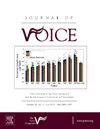介绍一种用于评估和监测嗓音风险状况和嗓音疾病的新型剂量计。
IF 2.5
4区 医学
Q1 AUDIOLOGY & SPEECH-LANGUAGE PATHOLOGY
引用次数: 0
摘要
目的:通过设备记录的许多生理参数越来越经济、精确和准确。然而,从生理学或医学的角度来看,语音参数的记录却缺乏发展,这一点令人震惊,因为语音是许多人工作的基本工具,而且影响人们交流的语音病症的发生率和流行率都很高。在本文中,我们对嗓音研究中使用的剂量计进行了全面的文献综述,并介绍了一种剂量计原型,通过试点研究展示了其功能:我们在 PubMed、Trip Database、HONcode 和 SciELO 等搜索引擎上搜索了[监测]、[传声]、[集聚器]、[便携式]、[剂量计]、[语音]等关键词,进行了文献综述。通过对剂量计设计的审查,我们创建了自己的原型,由两个主要组件组成:安装在颈架上的 Knowles Electronics BU-7135-0000 加速度计和超低功耗 MSP430FR5994 微控制器。选定的采样频率为 2048 Hz。该设备每 250 毫秒计算一次 F0,每 31.25 毫秒计算一次振幅和发音活动。使用 2 名受试者进行了试点研究:一名男性在 11 天内,另一名女性在 14 天内:这项工作包括过去 45 年中作为诊断和监测嗓音病症治疗病例的工具,以及用于检测发音模式或嗓音疾病或嗓音病症风险情况的设备。我们还展示了我们的新设备在不同日子里对两个受试者的日常谈话时间模式、基频和相对强度的记录:在嗓音剂量计的开发过程中,我们采用了不同的方法,取得了令人感兴趣的成果。根据我们的经验,目前还无法将其用于研究,也还没有应用于临床。如果嗓音和嗓音疾病专业人员与工程师密切合作,就有可能利用现有技术开发出完全便携、实用和高效的系统。本文章由计算机程序翻译,如有差异,请以英文原文为准。
Introducing a New Dosimeter for the Assessment and Monitoring of Vocal Risk Situations and Voice Disorders
Purpose
There are many physiological parameters recorded by devices that are becoming more affordable, precise and accurate. However, the lack of development in the recording of voice parameters from the physiological or medical point of view is striking, given that it is a fundamental tool for the work of many people and given the high incidence and prevalence of voice pathologies that affect people's communication. In this paper we perform a complete literature review on the dosimeters used in voice research and to present a prototype dosimeter with a pilot study to show its capabilities.
Method
We conducted a literature review using the keywords [MONITORING], [PHONATION], [ACCUMULATOR], [PORTABLE], [DOSIMETRY], [VOICE] searching in PubMed, Trip Database, HONcode, and SciELO search engines. From our review of dosimeter designs, we created our own prototype consisting of two main components: a Knowles Electronics BU-7135-0000 accelerometer mounted on a neck brace; and the ultra-low power MSP430FR5994 microcontroller. The selected sampling frequency was 2048 Hz. The device calculates the F0 every 250 ms and the amplitude and phonation activity every 31.25 ms. A pilot study was conducted using 2 subjects: one male during 11 days and one female during 14 days.
Results
This work includes devices that have been created during the last 45 years as tools for the diagnosis and monitoring of the treatment of cases of vocal pathology and for the detection of phonatory patterns or risk situations for developing voice disorders or vocal pathologies. We also present recordings with our new device on the pattern of daily talk time, the fundamental frequency and the relative intensity of two subjects on different days.
Conclusions
Interesting work has been done in the development of voice dosimeters with different approaches. In our experience it is not possible to access them for research and they are not yet in clinical use. It is possible that a joint approach with voice and voice disorders professionals and engineers working closely together could take advantage of current technology to develop a fully portable, useful, and efficient system.
求助全文
通过发布文献求助,成功后即可免费获取论文全文。
去求助
来源期刊

Journal of Voice
医学-耳鼻喉科学
CiteScore
4.00
自引率
13.60%
发文量
395
审稿时长
59 days
期刊介绍:
The Journal of Voice is widely regarded as the world''s premiere journal for voice medicine and research. This peer-reviewed publication is listed in Index Medicus and is indexed by the Institute for Scientific Information. The journal contains articles written by experts throughout the world on all topics in voice sciences, voice medicine and surgery, and speech-language pathologists'' management of voice-related problems. The journal includes clinical articles, clinical research, and laboratory research. Members of the Foundation receive the journal as a benefit of membership.
 求助内容:
求助内容: 应助结果提醒方式:
应助结果提醒方式:


